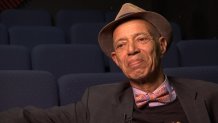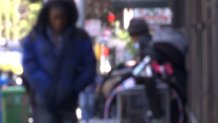In the middle of the intersection of Turk and Eddy Streets in the heart of San Francisco's Tenderloin neighborhood. Right in the middle.
That is where 70-year-old Del Seymour hit rock bottom. It was 2009 and Seymour was in a fight over an unpaid drug debt.

"I'm rolling around in the street with a guy 30 years younger than me and 150 pounds heavier," Seymour said. "I'm a granddaddy. I'm in my early sixties and I say, 'What the hell am I doing? What the hell am I doing?'"
It was, Seymour said, the last time he ever used drugs. It remained as vivid a memory to Seymour as the first time he ever used drugs close to 20 years earlier.
"I put a crack pipe in my mouth for 18 seconds and it took me 18 years to get it out," Seymour said.

During those 18 years, Seymour was a fixture on the streets of the Tenderloin. In addition to his addiction, Seymour admits to selling drugs as well. His more than one dozen felony arrests during that time back up that claim.
Local
But after the fight, Seymour began the long process of putting his life back together. His energy these days is spent helping others do the same. Seymour's dream is the improve life in the troubled Tenderloin but not by pushing current residents out. He wants to help them up.
It began with an offbeat idea: walking tours of the Tenderloin.

Seymour began charging groups of outsiders to give them an insider's view of the neighborhood. It was during one of those tours that a young female drug dealer called out to Seymour.
"Del, what are you telling those white folks?" Seymour recalled her saying. "I hope you are telling them that we don't like doing this. What do you want me to do? Where do you want me to go?"
Seymour didn't have an answer then but he does now.
Seymour soon founded Code Tenderloin, a job training program for those who want to do what Seymour did. He says in the past few years they have placed dozens of Tenderloin residents in good-paying jobs.
In the process, Seymour, once infamous is now in demand in his neighborhood. The "Mayor" of the Tenderloin is what some call him.
It seems there is hardly an initiative to help the neighborhood's poor, homeless, a drug-addicted that doesn't seek out Seymour's support.
He says he still regrets all those years lost to drugs but what he's doing now isn't penance for that.
It's something better.
"When one of the deepest gang members walks through that door says, 'I got that job,' that’s not penance. That’s reward and I'll do that every day."



